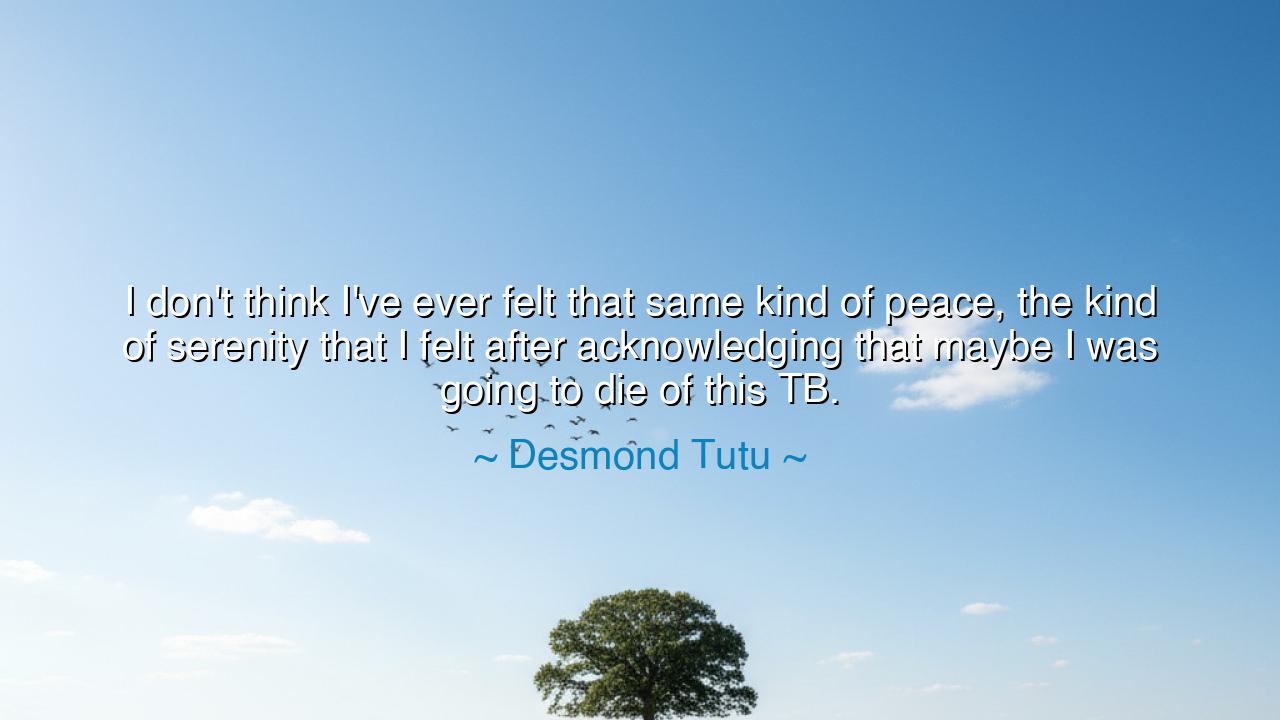
I don't think I've ever felt that same kind of peace, the kind
I don't think I've ever felt that same kind of peace, the kind of serenity that I felt after acknowledging that maybe I was going to die of this TB.






"I don’t think I’ve ever felt that same kind of peace, the kind of serenity that I felt after acknowledging that maybe I was going to die of this TB." So spoke Desmond Tutu, shepherd of souls and warrior for justice, whose life was marked by both suffering and radiant joy. In this reflection, he reveals a paradox known to the wise of every age: that in the moment when death is accepted, life itself is seen with new clarity, and a strange and profound peace descends upon the heart.
The ancients, too, bore witness to this mystery. The Stoics of Greece and Rome taught that fear of death is the greatest chain upon the soul, and that freedom comes when one embraces mortality as part of nature’s law. For what man truly lives if he trembles at every shadow? Tutu, in his own affliction with tuberculosis, walked through this truth not as an idea but as an experience. When he ceased to resist the thought of death, he was granted not despair but serenity—the calm of one who no longer wrestles with inevitability.
History offers us similar stories. Recall Socrates, who drank the hemlock with tranquil spirit, speaking calmly to his companions of the immortality of the soul. His acceptance of death transformed his trial from tragedy into triumph. He feared not the end, and so his disciples saw in him the embodiment of peace. Tutu’s testimony echoes this same wisdom: the act of surrendering to truth strips death of its terror and clothes the soul in unshakable stillness.
Or think of Nelson Mandela, imprisoned for long years, uncertain if he would ever see freedom. In that place of suffering, he too made peace with the possibility of dying in chains. That acceptance freed him from despair, and gave him a strength that tyrants could not touch. When he emerged, he did so not as a broken man, but as one tempered by serenity. In such examples we see that death, once embraced, loses its sting, and life becomes richer, fuller, freer.
Tutu’s words are not only about death—they are about acknowledgment. To acknowledge truth, even a painful truth, is to step out of bondage. Denial is the true torment, the endless war of the mind against reality. But acknowledgment, even of mortality, becomes the doorway to peace. The serenity he describes is not the absence of fear, but the triumph of acceptance, the quiet strength that comes when the soul no longer flees from what must be.
O children of tomorrow, learn from this teaching: do not live in fear of death, for in fearing death, you will never live. Instead, embrace your mortality, and let it awaken you to the preciousness of each day. When you acknowledge that life is finite, every sunrise becomes a gift, every word of kindness a treasure, every breath a miracle. The awareness of death is not a curse, but a teacher—reminding you to love deeply, to forgive swiftly, and to walk gently upon the earth.
Therefore, practice this discipline: speak honestly about the brevity of life, do not turn from the thought of death, but let it sharpen your vision. Make peace with your fragility, and you will find within yourself a strength unshakable. For as Desmond Tutu discovered, the strange fruit of surrender is peace—and those who learn this truth will not be ruled by fear, but will live boldly, joyfully, and fully, until the final breath.
Thus let his wisdom echo across generations: when you cease to fear death, you awaken to life. And in that awakening, you discover the greatest serenity a human heart may know. Would you like me to shape this into a meditative narration, with slow, flowing rhythm, so it feels like the voice of a sage guiding listeners into acceptance and peace?






AAdministratorAdministrator
Welcome, honored guests. Please leave a comment, we will respond soon